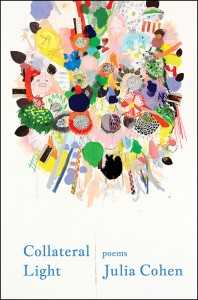Collateral Light by Julia Cohen
 Collateral Light
Collateral Light
by Julia Cohen
Brooklyn Arts Press, Oct 2013
94 pages / $15.95 Buy from BAP or SPD
On the first page of “No One Told Me I Was the Arrow”, Julia Cohen writes:
a life
of sea-
sickness
dreaming of ships
An insect
on snow
At the limit
of our
body
a brief spasm
of laurels
Caught, sickness, limit, spasm. No one told her. In this, the first poem in Collateral Light‘s first section, Cohen seems to be setting forth an aesthetic program both in her subject matter and in the laconic precision of her style: To move over the frozen terrain of an aestheticized life, practicing an insect-like lightness and thereby avoiding falling into the ‘snow’. This is not, in itself, an unadmirable pursuit. It is also one to which poetry is particularly well-adapted–is there any medium more capable of lambently exploring ‘the limit/of our/body’ without becoming mired? And yet perhaps I can be forgiven that my heart dipped in my chest at the prospect of another book devoted to elegies on the subject of inability and asymptotes. It therefore came as both a surprise and a relief when Cohen discards her regretful tone at the poem’s conclusion:
my point
plunge
into a glass
of soil
“An insect/on snow” nothing, O me of little faith. Cohen is ready and able to dive within. In Collateral Light, we have the pleasure of going with her.
Over course of the poems following this introduction, Cohen delivers on the promise vested in the conclusion of “No One Told Me I Was The Arrow”. Her writing revolves around shifts, mutations, permanence, lability. Certain terms recur with such regularity that they become fraught, even overloaded, with meaning. Arrows (those symbols of both indication and entry) appear again and again, both negatively (“My pixels/deflect arrows”) and positively (“I’m filled/with invisible arrows”). Coats, husks and shells are shedded or pierced, disrupting the boundaries between the within and without of a given person (as when she writes, “Kiss my puppy lips my deer lips/the animal inside that animal/alive & yelping through the skin”). The introduction or relaxation of this confusion is at the center of many of Cohen’s more arresting passages, such as in the eponymous poem’s opening lines:
inside your face
& look down
at the sunken garden
My toes are cute
My packet of
bees comes in
Spreading whiteness, imperfect memory, gardens (be they sunken, frozen, night-, or made up of “Fake flowers burst forth from fake seeds”), ice, frost, veins, circulation and filtration. The throughlines multiply without compromising the slow, considered style. Cohen knows how to play to the strengths of that style; this is perhaps best-displayed by the particularly wonderful “The Decoy Museum Is Still”, in which sparse lines such as, “You walk into a stranger’s dirty pocket of air,” seize attention through their quiet profundity.
Cohen deserves to be lauded for what she is doing, but it’s nonetheless worth noting what she avoids doing. Her poems are both active and interactive, and yet possess none of the common signifiers that contemporary readers might associate with such terms. The rhythm is not argot-conversational or rat-a-tat percussive; the verses are not fit to bursting with pop-culture bricolage; there is no compulsive disgorging of confessional factoids. Cohen engages the reader through the steady application of precise language, carefully maintained across the length of each individual work. She never abandons her mode in favor of spasmodically gesturing beyond the limits of comprehensibility. If it seems like I’m belaboring the point, here, it’s because it’s a point that could stand a little belaboring: In a time when contemporary poetry is frequently (and unfairly) pigeonholed as belonging to either a hermetically classicistic tradition or a hypermodern, glossolalic movement, Cohen does not allow herself to be lumped in with either.
December 2nd, 2013 / 12:00 pm
